Engagement Feature Articles
BNPP AM - Managing Sustainability: Discussing the Future of ESG and the AM Industry
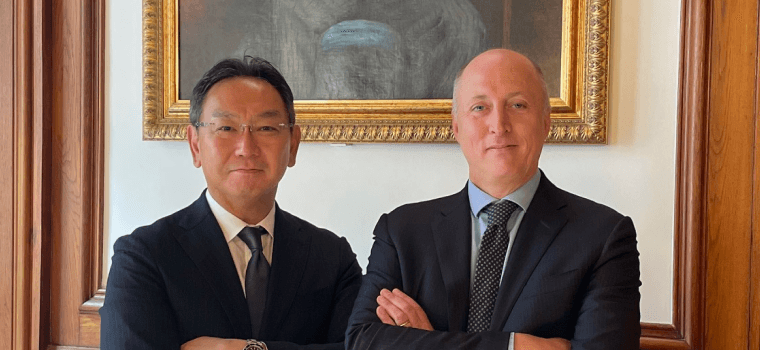
Left: Hiroyasu Koike, President and CEO of Nomura Asset Management (NAM)
Mr. Hiroyasu Koike, President and CEO of Nomura Asset Management (NAM) and Mr. Sandro Pierri, CEO of BNP Paribas Asset Management (BNPP AM) met in Paris to share their views and experience on important industry topics. During their conversation, they discussed the importance of ESG and the sustainability agenda, technology and the workplace, growth of the private asset space and the evolution of culture in asset management.
Envisioning the Ideal ESG Framework
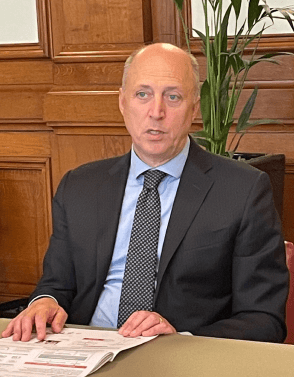
Koike As sustainable investing grows as a global trend, end investors are becoming more vocal in demanding that we incorporate ESG considerations into our investment process. I am interested to hear your thoughts on building a framework for ESG implementation, particularly with a focus on making investment outcomes more tangible and appealing to investors. In particular, a growing number of clients are demanding that we manage portfolios to support the realization of net zero. They are increasingly interested in knowing what steps we are taking to align investments with the Paris Agreement.
Pierri Yes, that is a key consideration for us as asset managers. One way to make ESG more tangible is to share the real stories of what our investee companies are actually doing to work towards achieving net zero emissions by 2050. This brings it to life in a more engaging way. We have produced a range of these stories in our Sustainability Report over the past two years as an example.
Koike If I may change the perspective of our conversation slightly, how do you view comments from some financial institutions and other companies arguing that the Russia/Ukraine conflict is slowing down the ESG agenda?
Pierri Actually I disagree with this view, because I think it has forced the world into realising that the dependency on fossil fuel is a much bigger problem than initially thought. So, while we recognize the issues that must be addressed in the short term, as we need to find solutions to cope with the upcoming winter, we also think it has actually accelerated strategic thinking about the need to reduce energy dependency. I think support from government in terms of funding, resources, and regulatory framework will simply be accelerated.
While some latecomers to ESG implementation who may be slowing down due to current financial pressures, this is one of the areas in which we don't compromise. We believe this is a great opportunity to be leading this transformation and so are sticking to our investment plans.
Koike I see our thinking is aligned on this topic. I believe the crisis has motivated many governments to take a much more serious stance on addressing fossil fuel dependency. While we are on the topic of Europe, could you share your thoughts around the EU's regulatory framework as it relates to ESG? It also seems that the UK is pursuing its own framework following Brexit.
Pierri This is one of the very important questions we are trying to address given that the majority of our business is in Europe. It's not perfect but we believe Europe is much more advanced in terms of regulation on sustainability.
Regarding your second point, there are different standards across the region so we would like to see a regulatory convergence across Europe. We would welcome a regulatory framework that provides a level playing field so we may invest in building our product infrastructure with clear regulatory standards.
Even in Asia there is discussion of regulatory standardization, and I think Singapore is attempting to position its system as the most important standard when it comes to Asian funds. I think that in the medium term we can expect convergence, much as we saw with UCITS regulation beginning as the main regulation for open ended funds in Europe, only to spread as an important standard in Asia and parts of Latin America as well. This is a competitive landscape, and I think each and every country will try to create their own framework but ultimately there will be convergence, even if it takes some time.
Koike Indeed, Japan has opted for a very different approach from Europe. Instead of a hard law regarding ESG, Japan has included ESG considerations into its Corporate Governance Code. Since the Code lacks any firm enforcement measures, it has been observed that market reforms will require more time. Meanwhile, if we look to the United States, regulators are in the process of crafting guidelines for the future, and top asset managers are already attempting to meet the new expectations. In order to provide the best quality ESG for our clients, I believe Japan will need to align with global trends in ESG regulations.
Pierri Engaging proactively as an industry with policy makers, regulators and the public opinion is the key to help shape the regulation in a way that is beneficial to all the different stakeholders. The transition to sustainability is a very complicated effort because the reality is that we are talking about a shift in capital allocation from brown to green. It is an enormous and complex undertaking that cannot happen in one go.
Koike You're absolutely right. Though there are some investors who believe we should completely divest from brown corporations, we support a more transformative approach. We make an effort to understand the companies in which we invest and continually create new standards to encourage reform. For example, we are developing a corporate assessment process which incorporates carbon pricing and GHG absorption efforts. These approaches have garnered attention from both regulators and companies.
Pierri I agree. Everyone has a role to play - financial intermediaries, assets managers, lenders, regulators, policy makers, and the public. The more you engage in the very early stage of regulatory discussions around regulation, the more you can positively influence the process to ensure the regulations will account for the many different complexities and nuances.
In Europe I think we have seen regulation coming together in different ways. While there have been aspects which facilitate a shift in capital allocation, discrepancies in approaches create the risk of inconsistencies between regulatory regimes. I believe you are in an advantageous position to learn from the experience in Europe, while at the same time ensuring that all players can really contribute to evolve the regulation.
The Just Transition: Interlinking E, S, and G
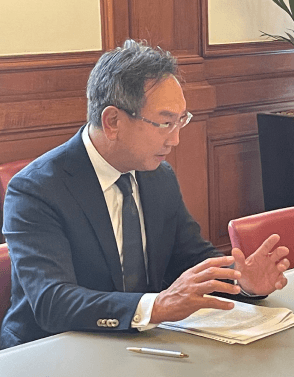
Koike As we have discussed, a collaborative process involving all stakeholders is critical when crafting regulation. However, once the regulation is implemented, there remain a number of issues. For example, in the ESG space it is very easy to visualise the ‘E' - carbon neutral, net zero, climate change, whereas it is considerably more difficult to represent biodiversity or social issues like human rights.
Pierri This is an area we sought to address three years ago when we put together our Global Sustainability Strategy. Within the E, S and G there are many potential themes that you need to be involved in. As part of our strategy we have decided to focus on what we call the three E's which is Energy, Environment and Equality.
Energy and the environment are clearly part of the E whereas diversity and equality are much more part of the S. However, the reality is that the E and the S are very much interlinked because of the fact that we need to engineer what is now called the "Just Transition" as we just cannot think about energy transition without thinking about the S.
Koike In Asia, we often see the simple term "Transition." However, as you mentioned, the concept of a "Just Transition" is an important topic.
Pierri There are views that we need to look at the E, S and G separately but in our view it is complex as they are very much interlinked and I think we need to look at them together. It is clear though that the E is a space where a number of players have created products and spent great effort. I think the S is still not very crowded - there isn't a lot of product. However, this is an area in which we see potential and which we are growing. Our recent product launches in this field include a social bond fund, a sustainable Climate Transition bond and, in Asia, an inclusive growth equity fund themed around equality.
Also, viewing these themes through the lens of the UN sustainable development goals can reveal how a particular theme can combine many goals, be it social or environmental. It's useful in seeing how E, S & G are really connected.
You may also be interested to note that a couple of months ago we announced a partnership with a Danish fin-tech company called Matter. We have co-developed what we believe is a state of the art SDG model whereby we can attribute each and every revenue line, or the issues that we follow, to the different SDGs. This technology over time will help provide investors with a framework to understand the extent of the alignment of a company's revenue streams with individual SDGs and targets, as well as across multiple SDGs and targets. It can assist investors in enriching their approach to sustainability analysis.
Koike I agree that E, S and G are tightly linked. We feel it is very important to connect the E, S, and G in the social context.
Many of Japan's social issues are particularly pronounced in rural areas, making it difficult for investments to flow to where they are most needed. A positive cycle of solutions to various environmental and social challenges requires the creation of a virtuous cycle of sustained investment. That's why NAM has created this investment fund with an endowment scheme to facilitate the circulation of money from urban areas to rural areas. In one of our responsible investment initiatives, for example, we are now providing ESG balanced funds to be distributed by many regional banks. In each prefecture where these banks operate, revitalisation of the regional economy is a serious issue. We determined that we could best contribute to these issues by donating a portion of our management fee to each prefecture for the purpose of economic revitalization.
We are aiming to address Japan's unique structural problems in a way that will lead to the resolution of local problems, and the reallocation of capital that will lead to this change. On the topic of change, you have mentioned in the past how changes in technology, sustainability and demographics can cause disruption. Can you share a more detailed view of what you expect?
Pierri This is the framework we are using to help assess our strategic direction for the future. We believe we are living in a period that is quite unprecedented with a number of disruptions at work.
The first of these disruptors is sustainability. Supporting net zero requires an additional $3.5tn of investment, per year, between now and 2050. Just to put things in perspective this would account for approximately 50% of global corporate profits. It is probably the biggest shift in capital allocation that we have seen in the last 60 years and it will clearly impact the way we look at financial returns of certain companies - there will be winners and losers. There will be physical asset risks in a number of companies that aren't involved in the transition. The most important element is to understand those factors clearly. Transition and engagement are going to be key to support that.
Technology is pretty straight forward. With the increasing use of data, AI & digital technology we will see impact on the distribution side - how can we create a digital experience for clients, how can we create efficiencies and operate more efficiently?
The third disruptor is demographics, because what you are seeing is an increasing divide between the aging populations of the western world and growing emerging markets. We are seeing a burgeoning wealthy middle class in the emerging markets and at the same time we have the aging of the millennial generations.
And finally, there is geopolitics that has caused a lot of shifts recently.
Koike Yes, aging demographics is a theme that has long been linked to Japan. In truth, as you note, it is an issue that all developed economies must address.
Pierri What is interesting about these three disruptors is that they are self-enforcing but potentially also contrasting. A key aspect of the "Just Transition" is the convergence of sustainability and demographics, and we need to find a way to reconcile this. For example, we cannot think of supporting a net zero transition without thinking of the impact this would have on emerging markets - the number of jobs in the economy that is dependent on this. The same with technology, as in technology demographics. The growing proportion of aging millennials would imply that client interactions will be increasingly digital.
There is also the emerging trend of geopolitical instability. This is something that may be very visible with the ongoing Ukraine/Russian crisis but I think we have already seen the seeds of our geopolitical instability previously. This will have future consequences on the cost of doing business with the disruption of the supply chain, plans for nearshoring and friend shoring, and the end of the traditional offshoring model. Inflation had been driven down in the last 15 to 20 years because of globalisation. Now, I think globalisation will evolve from what we have seen in the past, thereby adding new disruption. Following these four disruptors is going to be critical to understand the implications for business.
I am absolutely convinced that this is one of the best times for active management. Winners and losers emerge during these moments of disruption, and that is where a good active portfolio manager can make a difference. This is clearly a strong conviction that we have at BNPP AM.
Koike We could also say that these times of disruption call for sustainable investment. With the trends of social responsibility, ESG and impact investment, asset management does not only have implications for the finance industry. It also has a significant impact on society as a whole.
Pierri I think this is an evolution - we went form just looking after the financial element to incorporating the diversity of the stakeholders. Now the way we look at our business is that we need create the right balance between clients' interests, employee interests, shareholder interests and society at large because we have a very important role to play. How this is going to go in the future, I don't know, but I think is important to notice the social element. The impact of larger society is going to grow which is why we think the sustainability angle in general will be absolutely crucial. It will become a core process of the way we are going to do business.
Transforming the Workplace with Digital Technologies
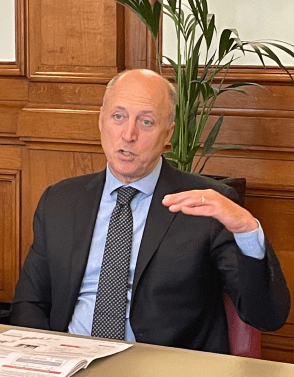
Koike Technology is sometimes said to eliminate jobs from the workplace but it is very important for us to help push economic growth. In these uncertain times, existing labor customs and practices have become less effective, and we have seen renewed awareness of the importance of investing in human resources to realize improved corporate value. This has directed attention to Digital Transformation, or using technology to unlock new potential. How do you see technology and human interaction co-existing?
Pierri If we look at our business I think the need for good portfolio managers will always be there. This is particularly true currently when we are experiencing an inflection point to the patterns we have experienced in the past. I think technology, data, and machines are very good at detecting patterns that are constant. However, when encountering a lack of continuity, machines are probably not exactly at the same level as humans are. The interaction between human and machine will be the key to success in our industry. For example the machine learning element of technology is a key component for us and probably one of the best examples of the human/machine interaction.
Koike Since the onset of the global pandemic, working culture has been changing. Technology is indispensable in coping with these new challenges and making it easier to work from home for both companies and employees.
Pierri Technology enables us to improve our lives. If we keep that in mind, I think that's the way we can mix the two elements. We should not deviate from that assumption and rely on technology as the solution to all the issues that we have - it's an enabler for us as businesses and as individuals.
Koike Even as we incorporate solutions to facilitate remote work, it is important that we do not lose sight of the importance of in-person interaction. In Japan we still have a face-to-face consulting business. This is important in Japanese business culture and key to promote our business to Japanese customers.
Pierri Face to face interaction is also critical for us. There is nothing that will replace the informal talks that colleagues have in front of the coffee machine - which is what I call the creative part of our job. We need this creative part to continue to be a significant ingredient. It cannot be replaced with digital interaction because new ideas or new thoughts come from people spending time together. In fact, now that we have relaxed our travel policy, we had our first leadership offsite bringing 200 senior leaders from different parts of the world. Everyone was so happy to be spending time together and there is nothing that can replace that. So I think the lesson here is that we need to go into hybrid mode - technology is important and increasingly more important in terms of interaction with clients, but the old model of creating social bonds will still be absolutely important. That's at least what we are trying to do here.
Expanding into the Private Sphere
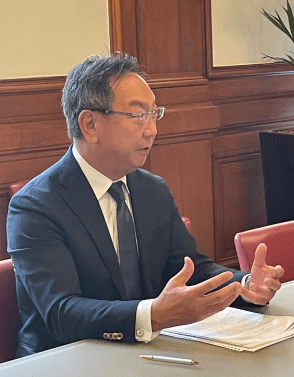
Koike You mentioned that the private asset business is key for you. At NAM, we have handpicked private asset managers from around the world to connect with our Japanese clients. As of September 2022, we have a commitment of JPY 1.6 trillion, of which 47% is private equity and 40% is infrastructure. Earlier in April of this year, we also launched Japan's first private trust investing in unlisted US REITs (Real Estate Investment Trusts).
In May 2022, we took a further step in expanding our private real asset business with an investment in New Forests Pty Limited, the world's second largest forestry asset manager.
We are proceeding with plans to expand our product offerings in the private asset space within Japan. Could you tell me more about your products in this area and how are you evolving your private product range on top of public mutual funds?
Pierri This is a key product initiative that we have built over time. The focus for the time being is exclusively on private debt. We have gone through a journey of starting from the more senior secured loans in the product space, to the more junior and unsecured loans, but the spectrum that we cover is quite broad. We have loans, SME loans and SME funding. We have infrastructure debt, commercial real estate debt, US mid-market loans and we are actively launching our junior infrastructure debt product. So it's really an evolution we are quite happy with the breadth of the product offering that we have.
There are two areas of evolution in the private asset space. The first is in regard to increasing the ESG impact features of the product. It's already a significant portion which I think will grow in importance given our position on the sustainability side. The second driver of growth is the fact that we see increasing demand for not only allocation to individual product lines within the asset class, such as infrastructure debt, but we see potential for what we call ‘solutions' built around private assets. We call this our diversified private credit. We build solutions typically for long term investors, with long term liabilities, where we match the different components of private assets to create a liability driven portfolio or a cash flow matching portfolio, capturing the liquidity premium. This is an area where we have seen significant growth over the past couple of years and where we want to be active.
Unifying Culture with Purpose
Koike You have pointed out the importance of human capital for your company. A large financial group includes a wide variety of divisions, and within that, I have found that asset management has its own unique culture. While this is quite natural, given the differing natures of each business, I also believe there should be some consistency in terms of overall group culture. Within Nomura group, I feel there is a strong identity that unifies us, but I am interested how you reconcile this at BNP Paribas.
Pierri The BNP Paribas group is a very large diversified group employing more than 200K people globally across a large number of business from investment banking, consumer loans, leasing, asset management and insurance. Of course each business has its own culture but there is a commonality to the culture which is part of the DNA of BNP Paribas. There are clear objectives of the BNP Paribas group such as being long-term oriented, the importance of sustainability and doing business with respect for clients.
In my 5 years' experience at BNP Paribas there is a very good cultural commonality among the different businesses, but at the same time, you are right, asset management is a very specific culture as a business. So our job is also about how we translate the commonality that is part of the BNP Paribas group into something that is more asset management specific.
There are a few really important elements. The first is performance. At the end of the day our duty is to generate sustainable performance for our clients, so the fiduciary duty and the need to generate performance is absolutely key. The second element is what we call clients and duty. We need to generate performance but we need to always think in terms of how we serve our clients because that's our duty. So we need to have a culture where the whole firm really feels that they are at the service of clients. The third element is sustainability, which is really now becoming part of our DNA and is included in our strapline, The Sustainable Investor for a Changing World. Sustainability really is at the core of what we do. The last point I will make on this topic has to do with the fact that at the end of the day people and colleagues want to have a sense of purpose. It's not only about working. It's about who do I work for and what is the purpose of what I am doing in life. A survey we carried out about a year ago highlighted that approx. 85 to 95% of our colleagues told us they are very happy with the position of BNPP AM on the sustainability side and they feel they have a purpose in life with the work that they do - to me that's the best answer. Creating a culture with some sense of purpose.
Koike I recognize similar aspects of BNP Paribas' culture mirrored in the founding spirit of Nomura Group.
When Nomura Group was established over 90 years ago, one of its founding principles was to aspire for success as a financial institution while contributing to the nation. This principle represents Nomura's unwavering commitment to creating a more prosperous society and today is expressed in our drive to realize sustainable growth through the resolution of social issues.
Nomura Group also aims to maintain a long-term orientation, placing important on both sustainability and doing business with respect for our customers. We have replaced our phrase "customer-first spirit" with the slogan "flourishing with customers."
Based on Nomura Group's overarching vision, NAM will continue to strive to provide the best solutions for our customers around the world and to function as an asset management company that contributes to society.
Thank you for your input on many important topics today. As an asset management company, expectations from all quarters of society are rising. NAM is working toward a more sustainable and prosperous society and it is encouraging to know that the entire industry shares that commitment.
This report is not intended as a solicitation or recommendation with respect to the purchase or sale of any particular investment.
(Date of publication: January 18, 2023)
